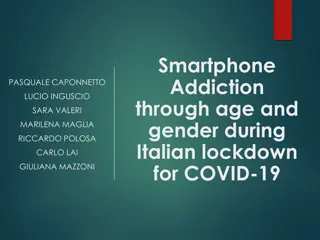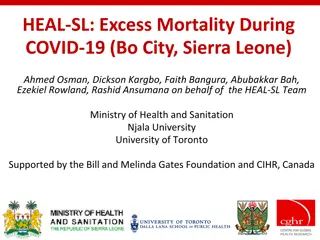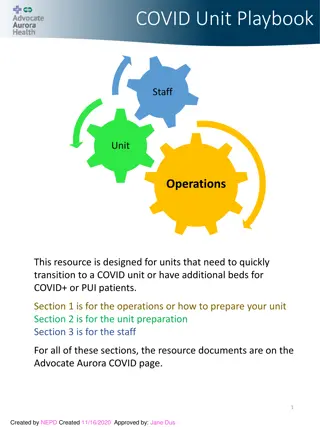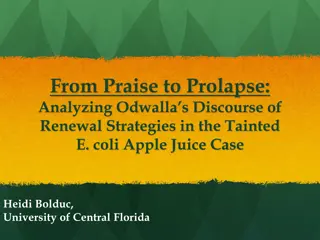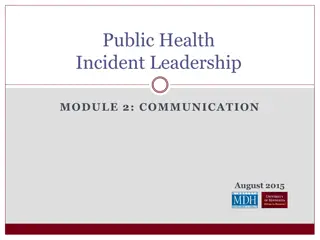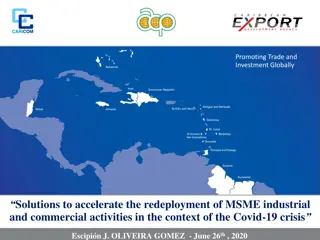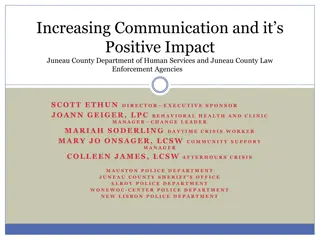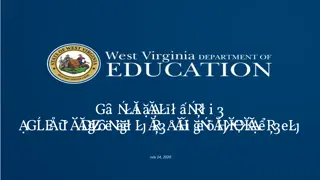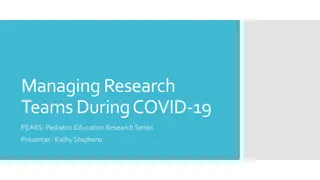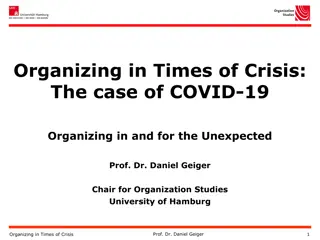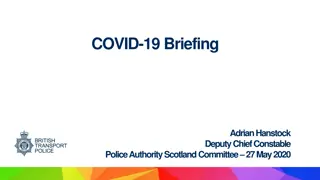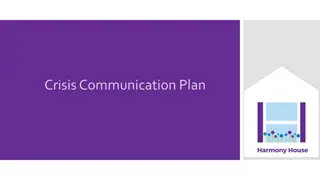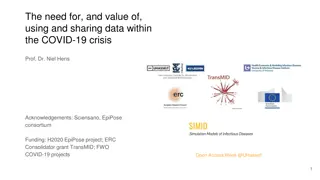Crisis Communication & Crisis Management During COVID-19: A Case Study
Understanding crisis communication and management during the COVID-19 pandemic through critical discourse studies, defining discourse, text, genre, frames, and coping strategies. Exploring the impact of COVID-deniers, conspiracy theories, and the role of political communication in addressing crises effectively with dialogue, truthfulness, transparency, and trust.
Download Presentation

Please find below an Image/Link to download the presentation.
The content on the website is provided AS IS for your information and personal use only. It may not be sold, licensed, or shared on other websites without obtaining consent from the author. Download presentation by click this link. If you encounter any issues during the download, it is possible that the publisher has removed the file from their server.
E N D
Presentation Transcript
CRISIS COMMUNICATION & CRISIS MANAGEMENT DURING COVID 19: A CASE STUDY Em. Professor Ruth Wodak, FAcSS Distinguished Professor and Chair of Discourse Studies Lancaster University/University Vienna r.wodak@lancaster.ac.uk http://www.ling.lancs.ac.uk/profiles/265
Fear is the name that we give to our uncertainty: to our ignorance of the threat and what is to be done - what can and what can t be - to stop it in its tracks - or to fight it back if stopping it is beyond our power. (Zygmunt Bauman Liquid Fear 2006, p. 2) It is in the nature of a crisis that a decision is due but not yet taken. The general uncertainty in a critical situation is thus pervaded by the certainty that - uncertain when, but certain, uncertain how, but certain - an end to the critical state is imminent. (Reinhart Koselleck Kritik und Krise 1973, p. 105).
COVID-19 a game changer? Defining Crisis(communication) Critical Discourse Studies Defining Discourse Studies Discourse, Text, Genre, Frames Legitimation Strategies Framing Crisis Communication: Coping with the Dread of Death Examples (Austria, France, Germany, Hungary, Sweden, New Zealand) COVID-deniers conspiracy theories Results, Perspectives and Alternatives OUTLINE
Change seems equally dramatic Healthcare suddenly issue number 1, bringing little known experts to the foreground Message control: press conferences, speeches, announcements at a bewildering rate Only some of the far-right populists deny the severity of the crisis or see a conspiracy New expert discourse in political discourse (and mediatized politics) New knowledge New vocabulary New arguments and logics COVID-19 and political communication
Leitfaden Krisenkommunikation, Berlin: BMI, p.5 CRISES ARE Open-ended Limited in time Not controllable Dynamic no clear trajectory Frequently very complex Crises are of high interest for media and citizens Crises could damage reputation Crises visibilize bad management Threatening important assets Unpredicatable surprising In scope and consequences hardly mangeable Unique situation Effective Crisis-Communication: Dialogic Orientation, Truthfulness, Transparency, Trustworthiness
Politics of fear and hope Has a new type of politics emerged, focused on contents (Sachpolitik)? Nationalism / re-nationalization How has Covid-19 affected or been instrumentalized for ongoing trends of re- nationalization and populism? Securitization Has there been a securitization of Covid-related discourses, paralleling the securitization of (im)migration, especially in terms of restricting civil liberties/human rights? Do existing theories and concepts still apply? Have ongoing trends been interrupted or intensified? Operationalized in terms of specific discursive strategies : Which old/new discursive strategies are being used in the above contexts?
Critical Discourse Studies The Discourse-Historical Approach: Discourse, text, genre, context
Discourses comprise context-dependent argumentation schemes and legitimation strategies that support claims, decisions, ideologies Discourses are polyphonic different agents endorse different positions Discourses manifest power strugglesover positions, sometimes condensed in single/specific words Discourses are historical always linked with other discourses (interdiscursivity) and other texts (intertextuality) Discourses comprise the recontextualisation (resemiotisation) of concepts across backstage & frontstage, genres, and time. Discourses power struggles over words/meanings
Discourse implies patterns and commonalities of knowledge and structures; Text is a specific and unique realization of a discourse. Texts belong to genres . Genre characterised as a socially ratified way of using language in connection with a particular type of social activity (Fairclough 1995: 14), used by communities of practice with specific functions (Swales 1992). Text creates sense when its manifest and latent meanings are read in connection with knowledge of the world( context models , shared knowledge , collective memories , resonance ) DISCOURSE, DISCOURSE, GENRE & TEXT GENRE & TEXT
Interdiscursive and intertextual relationships between discourses, discourse topics, genres, and texts Discourse A Discourse B genre x genre y genre z genre u textyz text x text u time axis topic x1 topic yz1 topic u1 topic x2 topic yz2 topic u2 topic x3 topic yz3 Adopted from Reisigl & Wodak 2016: 30 22
4-Level Context-Modell Discourses are always connected to other discourses which were produced earlier, as well as to those which are produced synchronically or subsequently. (Wodak 1996, 19) The DHA s context model (Reisigl & Wodak 2016, 30f): Co-text and co-discourse Intertextual and interdiscursive relationships Specific context of situation Socio-political/historical context
FRAMING CRISIS-COMMUNICATION- COPING WITH THE DREAD OF DEATH
Frames serve as interpretation frameworks , as worldviews or as cultural worldviews (Fillmore, Goffman, Cicourel, Lakoff, Entman .) The function of interpretation frameworks for text comprehension is to convey elements of meaning that can be invoked by speakers and writers as self-evident. Such presuppositions and expectations are picked up by the respective audience; statements are then invested with their complete meaning ( dialogicity ; Bahktin): FRAMES
Religious frame: Discursive construction of a saviour or of a strict father Dialogic frame: explanation of measures, discursive construction of caring father/mother War-frame: National war against the virus, militarisation and securitization of everyday life Trust frame: building on trust of people to government and institutions allows cost- benefit argumentation Analyzing Crisis - Communication (3/2020 - 6/2020) (Austrian, German, French, Hungarian, Swedish, Italian, Greek and New Zealand data: government speeches, press agency reports and press conferences) (Ruth Wodak [2021] Crisis Communication and Crisis Management during COVID Global Discourse; https://doi.org/10.1332/204378921X16100431230102 Ruth Wodak [2020] Krisenkommunikation in Corona-Zeiten In: Th. Schmidinger/J. Weidenholzer (Hg.) Virenregime. Wien.)
EXAMPLES Easter week will be a decisive week for us. It will be a week that will determine whether the resurrection after Easter that we all wish for can take place (Kurz, ZIB Spezial, 6 April 2020) Our Easter is taking place under special circumstances this year. The measures being taken demanded a lot from us but were necessary to prevent the worst. Four out of five people infected with Corona have no symptoms and therefore do not know that they are ill. This is one reason why the virus is so dangerous for our society. Next year at Easter, we want to be able to look back together and say, good that we defeated the Coronavirus . (Kurz, ZIB, 6.4. 2020). Before I explain in detail the expanded guidelines [ ], I would like to directly address all of those who are currently adhering to the necessary behavioral regulations. I thank you. [ ] I am very moved that so many people have adhered to these behavioral regulations. We have thus demonstrated our commitment to the elderly and those with prior illnesses, for whom the virus is most dangerous. Put simply: We are thereby saving lives. (Angela Merkel, 22.3. 2020) The restrictions of personal/individual liberties are an imposition on democracy (Angela Merkel, 23.4.2020).
I understand that all ofthis rapid change creates anxiety, and uncertainty. Especially when it means changing how we live. That s why today I am going to set out for youas clearly as possible, what you can expect as we continue to fight the virus together. (Jacinda Ardern, 21.3.2020) There has been some interest internationally in our approach to combat the virus. [ ] Our welfare state is universal, including the health care system. It is publicly funded and accessible to all. There is a tradition of mutual trust between public authorities and citizens. People trust and follow the recommendations of the authorities to a large extent. (Lena Hallengren, 23. 4.2020). [Our strategy] is built upon information and providing the population with knowledge [...] the success factors of our disease prevention is built on trust and faith (Johan Carlson, 20.3.2020). Nous sommes en guerre et face ce qui se profile, ce pic de l' pid mie qui est devant nous, j'ai d cid , sur proposition de la ministre des Arm es et du chef d' tat-major des Arm es, de lancer l'op ration R silience. (Emanuel Macron, 25.3. 2020) That is why we [ ] declared the state of emergency. The state of emergency means that the government has been given the authority and the means to organize Hungary's self- defensewith a chance of success. [ ] (Viktor Orb n, 30.3.2020)
LEGITIMATION VIA AUTHORITY LEGITIMATION VIA RATIONALISIATION LEGITIMATION VIA MORALISATION LEGITIMATION VIA MYTHOPOESIS LEGITIMATION STRATEGIES (Theo van Leeuwen/ Ruth Wodak [1999] Legitimizing immigration control: A discourse-historical analysis , Discourse Studies, 1(1): 83 118; Ruth Wodak [2018] Strangers in Europe : A discourse-historical approach to the legitimation of immigration control 2015/16 , in S. Zhao. et al. (eds.), Advancing Multimodal and Critical Discourse Studies. London, pp. 31 50.)
COVID-DENIAL CONSPIRACY THEORIES
Specific form of a negative stereotype (Oppenheimer, L. (2006) The Development of Enemy Images Peace and Conflict. J Peace Psychology 12/3: 271) Reservoirs of permanent externalization (Volkan, V. (2013) Large Group Identity, international relations, and psychoanalysis Int. Forum Psychoanalysis 18/4: 216) The collective violence towards the hostile group is justified through specific psychological delegitimization processes (Zamperini, A. et al. (2012) The Deconstruction of Enemy Images for a Nonkilling Society. In Christie, D. et al. (Eds.) Nonkilling Psychology. Honolulu: Creative Commons, p. 330) Shifting blame for complex problems on scape-goat; simple rescue narrative Defining Scapegoats/ Creating Enemy Images (Feindbild)
CONSPIRACY THEORIES, FALLACIOUS ANALOGIES, FAR-RIGHT INSTRUMENTALISATION OF PROTESTS https://www.daserste.de/information/wissen- kultur/ttt/videosextern/die-corona-leugner-und-die- demokratie-100.html https://www.swr.de/swr2/wissen/die- grosse-luege-corona-leugner-in-den-usa- 100.html https://www.woxx.lu/antisemitismus- corona-ein-gefundenes-fressen/
Relevant measures are delegitimized (waering of masks, etc.) Propagating bad medication Relativize danger Total denial of the existence of COVID, of the pandemic Selling wrong protection on-line Creating scape goats 6 Strategies of the Infodemic during the Pandemic (Hansson, S., Orru, K., Torpan, S., B.ck, A., Kazemekaityte, A., Meyer, S.F., Ludvigsen, J., Savadori, L., Galvagni, A., & Pigr.e, A. (2021). COVID-19 information disorder: Six types of harmful information during the pandemic in Europe J of Risk Research https://doi.org/10.1080/13669877.2020.1871058)
RESULTS, PERSPECTIVES, AND ALTERNATIVES
Re/Nationalisation Conspiracy theories and scapegoating Exclusion of vulnerable groups; generation conflict Rise of authoritarianism ( Message- Control ) Instrumentalisation of discontent Results: Challenges and Dangers Normalisation of restrictions Crisis of Human rights (J rgen Habermas/Klaus G nther (2020) Kein Grundrecht gilt grenzenlos Zeit Online 6. May 2020; Human Rights Dimensions of COVID-19 Response, 19 March 2020 (https://www.hrw.org/news/2020/03/19/human-rights- dimensions-covid-19-response)
Crises as processes of learning Investigation/reflection of modes of crisis communication Discussion of measures & restrictions Deconstruction of conspiracy theories Support of Transnational Solidarity Perspectives and Alternatives Reflective deceleration; participatory dialogue; imaginaries of mid-term and long-term scenarios
THANK YOU! r.wodak@Lancaster.ac.uk











